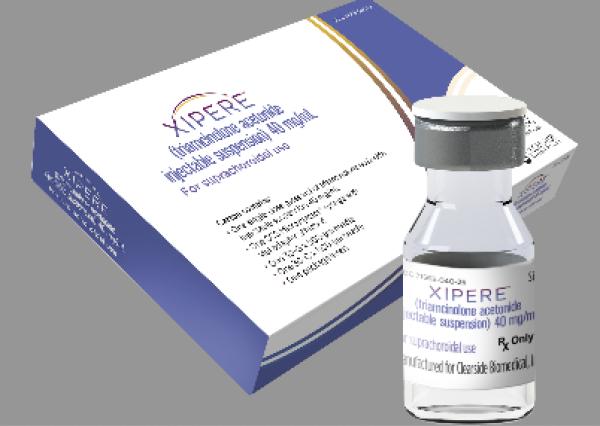Xipere
Generic name: triamcinolone ophthalmic (Xipere) [ trye-am-SIN-oh-lone-off-THAL-mik- ]
Drug class: Ophthalmic steroids
What is triamcinolone ophthalmic?
This medication guide is specific to Xipere.
Triamcinolone ophthalmic (for the eyes) is a steroid medicine injected into the eye to treat macular edema (eye swelling) caused by uveitis in adults.
Triamcinolone ophthalmic may also be used for purposes not listed in this medication guide.
Triamcinolone ophthalmic side effects
Get emergency medical help if you have signs of an allergic reaction: hives, difficult breathing, swelling of your face, lips, tongue, or throat.
Xipere may cause serious side effects. Call your doctor at once if you have:
-
eye pain or redness;
-
eyes being more sensitive to light;
-
vision changes;
-
increased adrenal gland hormones--hunger, weight gain, swelling, slow wound healing, sweating, acne, increased body hair, tiredness, mood changes, muscle weakness, missed menstrual periods, sexual changes; or
-
decreased adrenal gland hormones--nausea, vomiting, stomach pain, loss of appetite, feeling tired or light-headed, muscle or joint pain, skin discoloration, craving salty foods.
Common side effects of Xipere may include:
-
vision changes or eye pain; or
-
increased pressure inside the eye.
This is not a complete list of side effects and others may occur. Call your doctor for medical advice about side effects. You may report side effects to FDA at 1-800-FDA-1088.
Related/similar drugs
Warnings
You should not be treated with triamcinolone if you have an infection in or around your eye.
Before taking this medicine
You should not use triamcinolone ophthalmic if you are allergic to it, or if you have:
-
an infection in or around your eye.
Xipere can worsen or reactivate a bacterial, viral, or fungal eye infection you already have or have recently had.
Tell your doctor if you have or have ever had:
-
herpes infection of your eye;
-
cataracts, glaucoma, or another condition that increases pressure inside your eyes; or
-
a thyroid disorder.
Tell your doctor if you are pregnant or breastfeeding.
How is triamcinolone ophthalmic given?
Triamcinolone ophthalmic is injected into your eye by a healthcare provider. Your doctor will use another medicine to numb your eye before giving you the injection. You will receive this injection in the doctor's office or another clinical setting.
After the injection, you will be watched closely for any swelling, inflammation, increased pressure in your eye, or changes in your vision.
Call your doctor if your symptoms do not improve, or if they get worse.
You will need frequent medical tests and eye exams.
What happens if I miss a dose?
Call your doctor for instructions if you miss an appointment for your triamcinolone ophthalmic injection.
What happens if I overdose?
In a medical setting an overdose would be treated quickly.
What should I avoid after receiving triamcinolone ophthalmic?
Follow your doctor's instructions about any restrictions on food, beverages, or activity.
What other drugs will affect triamcinolone ophthalmic?
Medicine used in the eyes is not likely to be affected by other drugs you use. But many drugs can interact. Tell your doctor about all your current medicines, including prescription and over-the-counter medicines, vitamins, and herbal products.
More about Xipere (triamcinolone ophthalmic)
- Check interactions
- Compare alternatives
- Pricing & coupons
- Reviews (1)
- Drug images
- Side effects
- Dosage information
- During pregnancy
- FDA approval history
- Drug class: ophthalmic steroids
- Breastfeeding
- En español
Patient resources
Other brands
Professional resources
Other brands
Related treatment guides
Further information
Remember, keep this and all other medicines out of the reach of children, never share your medicines with others, and use this medication only for the indication prescribed.
Always consult your healthcare provider to ensure the information displayed on this page applies to your personal circumstances.
Copyright 1996-2025 Cerner Multum, Inc. Version: 1.01.

